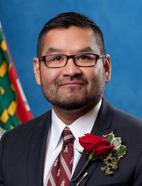Thank you, Mr. Speaker. I, too, stand before the House today in support of the Anti-Poverty Strategy. In terms of getting that strategy put forward, you know, if we’re talking about discussion papers, we’re talking about developing the strategy and bringing our groups together. We know what the problems are. Let’s start working on them now. We know what the underlying issues are that are leading our people into poverty. Let’s work on them now.
The governments have some really good initiatives. The departments have some really good initiatives.
Let’s tackle those underlying issues now so that we can start working on mitigating some of this poverty that we see in the Northwest Territories. We have a lot of good working people out there, a lot of NGOs that have been putting a lot of hard work, energy and efforts forward that it shouldn’t go unnoticed, and today we should start working on that strategy and getting those development papers forwarded. But within the departments we should look at ways we can do a little bit of work together to start working on this Anti-Poverty Strategy and not wait for that discussion paper to say, hey, we have the paper now. Let’s go to work.
Let’s do it now. Let’s start working within our departments. We are all doing a good job, but get those underlying issues and get those little problems solved. We know what they are right now. I don’t think, I know, coming from Inuvik, we have a lot of hardworking people there as well. We find the issues in our community. The communities come together and address those issues. We have a lot of concerns back home. We have a hard, strong working group of individuals there, as well, that tackle the problems. I feel that we can do that across the Northwest Territories as well. I am really glad to see this motion brought forth in the House today. I do support it.
As a government and as leaders and community leaders, we are all here for one purpose, and that is to help those people that have a hard time helping themselves and speaking for those people that can’t speak for themselves. We have to move forward on this and work with government. Even though the Anti-Poverty Strategy is not put in place right now, we still have to commend the government and all the hardworking people across the Northwest Territories for the little bit of efforts, the hardworking efforts, the energy that they have been putting in place already, and recognize that, and applaud them and continue to support them towards this Anti-Poverty Strategy. Thank you, Mr. Speaker.
